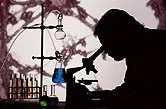Scientists invent faster analysis of chemicals with bacteria-killing abilities; experts stress need for new generation of infection-fighting drugs
WebMD News from HealthDay

By Amy Norton
HealthDay Reporter
FRIDAY, Sept. 20 (HealthDay News) -- Scientists say they've found a quicker way to analyze chemicals with bacteria-killing abilities in an advance they hope will speed the development of new antibiotics.
With bacterial infections becoming increasingly resistant to existing antibiotics, new drug development is crucial, according to Dr. Stuart Levy, president of the Alliance for the Prudent Use of Antibiotics.
"There's a real need for new antibiotics," said Levy, a professor at Tufts University School of Medicine in Boston who was not involved in the new study. There are still questions about the novel testing method described in the study, according to Levy, "but it's a step in the right direction."
The approach, detailed in the Sept. 16-20 issue of Proceedings of the National Academy of Sciences, could make it simpler for researchers to figure out how a bacteria-killing chemical works.
That's important because many compounds are capable of knocking off the bugs, but drug developers need to know the "mechanism of action," explained Joseph Pogliano, the senior researcher on the new study and a microbiology professor at the University of California, San Diego.
As it stands, drug companies have a huge number of chemicals they can scour to find ones that kill bacteria. And out of millions of compounds, there maybe tens of thousands that slay the bugs.
"It's actually pretty easy to find compounds that can kill bacteria," Pogliano said.
What's difficult and time-consuming, he added, is analyzing those chemicals' "mechanism of action." Researchers need to know that, in part, so they can narrow the field to compounds that are likely to kill bacteria without hurting patients.
And still another reason, according to Pogliano, relates to the problem of antibiotic resistance. "Bacteria are becoming resistant to the drugs we have," he said, "so we need compounds that work by new mechanisms of action."
The current approach to uncovering mechanism of action involves multiple tests, and can take months, Pogliano said.
The method his team developed takes two hours and works like an "autopsy" of a bacterial cell. The researchers used what's called a high-resolution fluorescence microscope to examine cells killed off by a given antibiotic compound, and then determined the likely cause of death.
"It's one test where we can look at the cells and say they died of this mechanism," Pogliano said. "It's like a pathology report on a (deceased) person."
The findings come at a time when the problem of antibiotic resistance is getting heightened attention. The U.S. Centers for Disease Control and Prevention issued a report Monday saying that more than 2 million Americans fall ill with antibiotic-resistant bacterial infections each year. At least 23,000 of those people die, the agency said.
source : Bacterial 'Autopsy' Could Speed Antibiotic Discovery: Study








